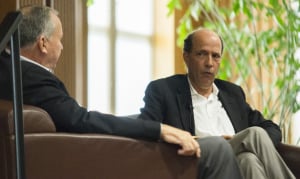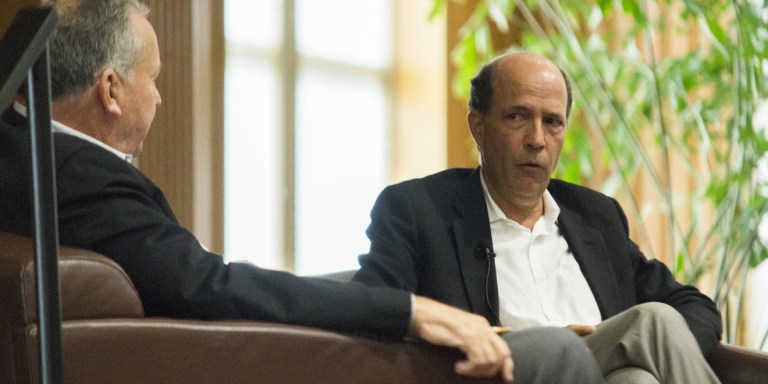
Former U. S. ambassador to Japan (2009-13) John Roos ’77 J.D. ’80 spoke to dozens of people at an event hosted by Stanford’s Shorenstein Asia-Pacific Research Center about his experiences as ambassador and his perspectives on East Asian affairs on Tuesday. Roos recounted his efforts to increase entrepreneurial activity in Japan, his experiences after the 3.11 earthquake in Japan, and his take on the proposed Trans-Pacific Partnership. The event featured a conversation between Roos and former U. S. ambassador to Japan (1989-93) Michael Armacost, followed by a question and answer session with the audience.
Besides talking about foreign affairs, Roos caused laughter when he told his audience that “one of the highlights of my ambassadorship was that I was an honorary captain during the Orange Bowl” for Stanford.
Roos talked at length about the 3.11 earthquake, which occurred on March 11, 2011, and the consequences of the quake. Roos described the earthquake, which killed over 15,000 people and measured 9.0 on the Richter scale, as “by far the biggest crisis I dealt with in my career.”
Roos said that his first call after the natural disaster was to the commander of U. S. military forces in Japan. Roos said that he declared an emergency soon after the disaster. Roos had a role in the U. S. humanitarian response to the disaster, which featured the U. S. armed forces delivering help to many of the regions devastated by the earthquake and the following tsunami.
Roos said that his plans to encourage entrepreneurship in Japan initially got pushback from part of his staff. Roos was pleased with the results of his efforts though, and said “over the past five years I’ve seen tremendous progress in that regard [entrepreneurship in Japan].”
Roos, who was appointed by President Obama, said that it was important to reserve access to the President for when he really needed it. “Having access to the President is important… being judicious about using this access is very important… and part of being able to get things done, I have found, was having that hanging over [people’s heads], the possibility of doing that [calling the President].”
Roos also talked about his work with the Tomodachi Initiative, which seeks to encourage bilateral exchanges of young people in Japan and the U. S. Roos said that he started the initiative after talking with the mayor of one Japanese town badly hit during the disaster.
Roos expressed confidence that the Trans-Pacific Partnership, a proposed free-trade deal, would be successfully completed. “I think it’s gonna happen,” Roos said.
Roos was positive towards recent changes in Japan’s defensive posture, which would allow Japan to take a more active role if the U.S. was attacked.
“For a lack of a better term, we need shared responsibility,” Roos said. Roos also talked about the recent tension between China and Japan over disputed islands.
Contact Caleb Smith at caleb17 ‘at’ stanford.edu
